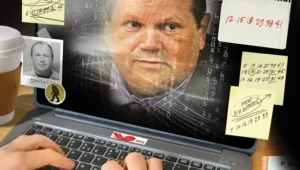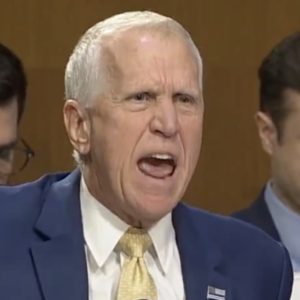Eddie Tipton jotted down the numbers on a yellow sticky note as he sat at his desk in Urbandale more than a decade ago.

Eddie Tipton, once a trusted security official for the Multi-State Lottery Association (MUSL), masterminded one of the largest lottery fraud schemes in U.S. history, stealing more than $24 million from lottery jackpots across five states. Tipton, a self-proclaimed “geek” with a passion for computer programming and a troubled past, used his position at MUSL, which oversees major lottery games like Powerball and Hot Lotto, to rig the system. He wrote a cryptic two-line code that enabled him to predict and manipulate the winning numbers for certain lottery draws, significantly improving the odds in his favor.
The scam began in 2005 when Tipton, frustrated by his workload and feeling underappreciated at his job, wrote a secret code that allowed him to target specific lottery drawings. By exploiting a vulnerability in the system’s software, Tipton was able to predict the winning numbers with stunning accuracy, narrowing the odds from 5 million-to-1 to 200-to-1. Tipton initially told investigators that he wasn’t motivated by greed, but by the intellectual challenge of cracking the system. His criminal journey was kickstarted by a casual conversation with a co-worker, Gene Schaller, who mentioned that Tipton’s software could potentially be used to set winning numbers. This conversation planted the seed for Tipton’s fraud, and that night he began to develop the software to manipulate the lottery.
Over the course of nearly a decade, Tipton exploited his access to MUSL’s random number generator software to rig lottery draws in Colorado, Iowa, Wisconsin, Kansas, and Oklahoma, winning at least five major jackpots. His first successful scam occurred in Colorado in 2005, where he targeted a $4.8 million jackpot. Tipton funneled the winning numbers to his brother Tommy, who used them to claim the prize. The numbers were selected on dates that Tipton had pre-determined as part of his plan—typically May 27, November 23, and December 29. Tipton later expanded the operation to other states, stealing millions through a combination of manipulation and third-party claims.
In 2010, Tipton orchestrated the largest of his heists, a $16.5 million Hot Lotto prize in Iowa. But it was this very jackpot that eventually brought him down. Tipton made the mistake of purchasing a winning ticket himself and attempting to claim the prize through an intricate scheme involving his friend Robert Rhodes. Tipton instructed Rhodes not to wait until the last minute to claim the prize, fearing the increased scrutiny it would attract. However, Rhodes ignored the advice, and the Iowa Lottery began to investigate the suspicious timing of the claim. Despite the anonymity measures, the case drew significant public attention, and the mystery over who had won the jackpot sparked widespread media coverage. It would take three years before investigators could trace the fraudulent claim back to Tipton.
As the mastermind behind the scheme, Tipton had a unique understanding of the lottery system’s vulnerabilities. His position at MUSL allowed him not only to write the rigged code but also to install it on the national lottery system without detection. Tipton worked long hours and complained of being overburdened by his responsibilities, which gave him the opportunity to exploit security lapses in the software. Despite raising concerns about the integrity of the lottery system, including a 2006 warning about a random number generator error in Wisconsin, Tipton’s warnings were largely ignored. His frustration with the system and his role in it only deepened over time, making him more determined to exploit the weaknesses he had identified.
The scam started to unravel in 2010 when Tipton, attempting to claim a Hot Lotto jackpot for himself, made a critical mistake. In December 2010, Tipton purchased a winning ticket at a Des Moines convenience store, and the purchase was captured on surveillance video. The ticket was claimed anonymously, but Iowa law required the winner’s identity to be made public. When the claim was delayed until the last possible minute, suspicions grew, leading to an investigation that eventually linked Tipton to the fraudulent draw. His scheme was further exposed in 2015 when the FBI charged him with felony fraud, money laundering, and conspiracy in connection to the manipulated lottery draws in multiple states.
Tipton’s criminal activities were enabled by a lack of oversight within the Multi-State Lottery Association. His supervisors were largely unaware of the vulnerabilities he was exploiting, and he was able to operate unchecked for nearly a decade. Tipton himself expressed frustration with the lack of security measures, even suggesting that MUSL needed to appoint a second person to oversee critical processes. However, despite Tipton’s attempts to address the security issues, his warnings were often dismissed, and no meaningful changes were made.
The fraud was so intricate that Tipton was able to execute it on multiple occasions without detection. The manipulation involved selecting specific dates for the winning draws, ensuring that he or his accomplices could predict and claim the prizes. Tipton’s brother Tommy, along with other associates, played key roles in claiming the stolen winnings, though they later faced legal consequences for their involvement. In one instance, Tommy Tipton tried to exchange hundreds of thousands of dollars in lottery winnings in 2006, leading to an FBI investigation. The investigation into Tommy’s activities only deepened the suspicion surrounding the Tipton brothers and their involvement in the rigged lottery draws.
By the time Tipton was arrested, the total amount stolen from the lottery system had reached over $24 million. Tipton, along with his brother Tommy and associates, faced numerous felony charges. Eddie Tipton was sentenced to up to 25 years in prison, while his brother Tommy received a 75-day sentence. Robert Rhodes, who helped Tipton claim one of the fraudulent jackpots, was sentenced to six months of home confinement and ordered to pay restitution.
The aftermath of the scheme raised serious questions about the security of lottery systems across the United States. While MUSL claimed to have implemented stricter security measures following Tipton’s arrest, some experts, including Tipton himself, believe that national and state lotteries remain vulnerable to similar fraud. Tipton’s unique expertise in lottery security and his ability to exploit weaknesses in the system highlights the ongoing risks in the integrity of lottery games.
As of 2024, Tipton is serving his sentence in Iowa’s Clarinda Correctional Facility. He has repaid a fraction of the $16.8 million in restitution owed, and his case continues to serve as a cautionary tale about the potential for fraud in lottery systems. Investigators believe they have uncovered all of Tipton’s fraudulent activities, though his brother Tommy claims there were at least two other instances of attempted fraud that were unsuccessful. Despite his refusal to speak publicly, Tipton’s confessions have shed light on the extent of the manipulation and the security flaws that allowed him to commit the crimes undetected for so long.




